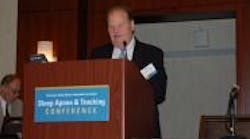“Through humor, you can soften some of the worst blows life delivers. And once you find laughter, no matter how painful your situation might be, you can survive it.” –Bill Cosby
You know, sleep disorders and fatigue are serious issues not only in trucking and the transportation industry at large, but for American society as a whole.
We’ll get to the funny stuff in a moment (and I just can’t resist funny stuff these days, with all the bad news out there – anyone care for a BP cocktail? Oil mixed with seawater with a splash of arrogance and foolishness added for taste????), but first, let’s look at why a plain-old good night’s sleep is so critical to human society.
Sleep apnea, narcolepsy, insomnia are just some of the more than 70 recognized sleep disorders affecting millions of people – and it’s estimated that nearly two-thirds of all Americans have difficulty sleeping for a plethora of reasons.
[The National Sleep Foundation (NSF) put together a few clips detailing how poor sleep impacts one’s ability to drive – and not just for truckers.]
You can survive for seven to 10 days without water (when temps hover between 70 and 90 degrees Fahrenheit) and anywhere from 10 days to three weeks without food (depending on your initial health, climate, and physical exertion) but no more than four days without sleep – at about day three, your body’s digestion system shuts down and you’re probably hallucinating pretty badly.
Thus, sleep is vital to human survival and it’s a restorative for the human body and mind. Those who sleep fewer than six hours a night don't live as long as those who sleep seven hours or more. And lack of sleep can be expensive, with the National Commission on Sleep Disorders estimating that sleep deprivation costs $150 billion a year in higher stress and reduced workplace productivity.
Now, according to the National Sleep Foundation (NSF), there are two different sleep factors to consider in humans: a person’s basal sleep need – the amount of sleep our bodies need on a regular basis for optimal performance – and sleep debt, the accumulated sleep that is lost to poor sleep habits, sickness, awakenings due to environmental factors or other causes.
[Here’s an NSF clip from a couple years ago that broadly looks at sleep deprivation issues. Note they discuss the average workday is around 9.5 hours; if only truckers could be so lucky! They face a 14 hour work day.]
The NSF said two studies suggest that healthy adults have a basal sleep need of seven to eight hours every night, but where things get complicated is the interaction between the basal need and sleep debt.
For instance, you might meet your basal sleep need on any single night or a few nights in a row, but still have an unresolved sleep debt that may make you feel more sleepy and less alert at times, particularly in conjunction with circadian dips – those times in the 24-hour cycle when humans are biologically programmed to be more sleepy and less alert, such as overnight hours and mid-afternoon. You may feel overwhelmingly sleepy quite suddenly at these times, shortly before bedtime or feel sleepy upon awakening.
The good news is that some research suggests that the accumulated sleep debt can be worked down or "paid off," NSF noted
Though scientists are still learning about the concept of basal sleep need, one thing sleep research certainly has shown is that sleeping too little can not only inhibit your productivity and ability to recall and consolidate information. Lack of sleep can also lead to serious health consequences and jeopardize your safety and the safety of individuals around you, including:
• Increased risk of motor vehicle accidents
• Increase in body mass index – a greater likelihood of obesity due to an increased appetite caused by sleep deprivation
• Increased risk of diabetes and heart problems
• Increased risk for psychiatric conditions including depression and substance abuse
• Decreased ability to pay attention, react to signals or remember new information
On the other hand, NSF said some research has found that long sleep durations (nine hours or more) are also associated with increased morbidity (illness, accidents) and mortality (death). Researchers describe this relationship as a "U-shaped" curve where both sleeping too little and sleeping too much may put you at risk.
OK, we get it – getting the right amount of sleep (not too much, not too little … achieving that “goldilocks” medium) is important. But everyone suffers from sleep deprivation from time to time, no matter our best efforts (parents of newborns especially … oh, was THAT a painful experience!)
So to take a “lighter view” of being caught napping at one’s desk (no such view can be taken when dozing off behind the wheel), Martin Walker, research division chief for the Federal Motor Carrier Safety Administration, came up with the Top Five list (a la the great David Letterman) of things to say to cover oneself when caught asleep at one’s desk during the workday. And they are …
Number Five: “They warned me at the blood bank that this might happen.”
Number Four: “Whew! I left the cap off the white out … you got here just in time!”
Number Three: “I wasn’t sleeping! I was meditating on the company’s mission statement in order to create a new business strategy.”
Number Two: “Why’d you interrupt me? I’d almost figured out that complex problem you asked me to solve."
And the Number One thing you should say to cover yourself if caught sleeping at your desk is …
“Raise your head slowly and say ‘Amen’ …”
With that, enjoy your weekend – and don’t forget to get some sleep!




